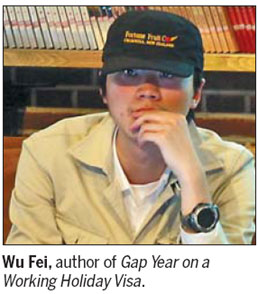Mind the gap, a break from reality
Updated: 2012-07-24 10:21
By Zhang Yue (China Daily)
|
|||||||||||
Wu Fei's trip to New Zealand put him in the spotlight and made him money.
His book, Gap Year on a Working Holiday Visa, tells of his one-year traveling and working experience in the country and has sold over 50,000 copies since it was published by China CITIC Press in February.
The 28-year-old from Shanghai has held more than 20 book-sharing salons over the past few months, and has thousands of followers on his micro blog, The Journey of Wu Fei.
Wu's work is the latest book on experiencing a gap year since 2009, when the first of its kind was published in China, according to Li Jingyuan from China CITIC Press, who is in charge of travelogue publications.
"Books that tell of an author's gap year experience overseas are popular in China these days," Li says.
The idea of a "gap year" became popular in 2009, when the 20-something Sun Dongchun from Guangdong province published his book - The Delayed Gap Year - about his experience of traveling in six countries in Asia, also by China CITIC Press.
It was a first for China, Li says.

Another gap-year book, Backpacker for a Decade, published in 2010 by Xiao Peng (who has been on a continuous 10-year-long gap year) remains a bestseller with 300,000 copies sold.
"These authors are mostly in their 20s, very passionate, and live in big cities. They are also very smart, and dying to make a change in their lives," Li says.
Mostly, they have the idea of producing a short movie, a novel or a travelogue when they start their gap year, so they have rich images and journal materials when they return, Li explains.
Their books may not have much literary weight, but appeal to readers with their dramatic, unique experiences, Li adds.
Since the first gap-year book was published in 2009, Li and her colleagues have organized book-sharing salons for these young writers with their readers.
"Most people interested in the gap year idea are university students and white-collar workers in big cities," Li says. "Our salons are held on campuses. University students are the most passionate about gap years."
Wu, the author, says that when he left Shanghai and started his gap year in April, 2010, not many acquaintances knew what it was.
This has changed, he says.
Wu's book tells of his one-year experience working 12 jobs, including at a Japanese restaurant in Palmerston North, cherry picking and acting as a ghost at a tourist destination.
Wu includes many travel tips in the book and gives guidance on how to find cheap, safe accommodation and jobs in New Zealand. The book also includes many pictures of New Zealand.
"Before the trip, I had lived a designed way of life, which is good, but not something I truly wanted," Wu says. "I was eager to take a year's break and try something that really thrilled me. Now, I am glad I can help others who want to make the same move."
zhangyue@chinadaily.com.cn
Related Stories
Paying the price for work experience 2012-07-22 13:33
Chinese travelers seek experience, not treadmill tourism 2012-07-17 08:57
Smile and take your own photo 2012-07-09 16:49
His dreams, drop by drop 2012-06-04 10:31
Learning how to vacation 2012-07-16 14:34
Today's Top News
Rescuers race against time for quake victims
Telecom workers restore links
Coal mine blast kills 18 in Jilin
Intl scholarship puts China on the map
More bird flu patients discharged
Gold loses sheen, but still a safe bet
US 'turns blind eye to human rights'
Telecom workers restore links
Hot Topics
Lunar probe , China growth forecasts, Emission rules get tougher, China seen through 'colored lens', International board,
Editor's Picks

|

|

|

|

|

|





